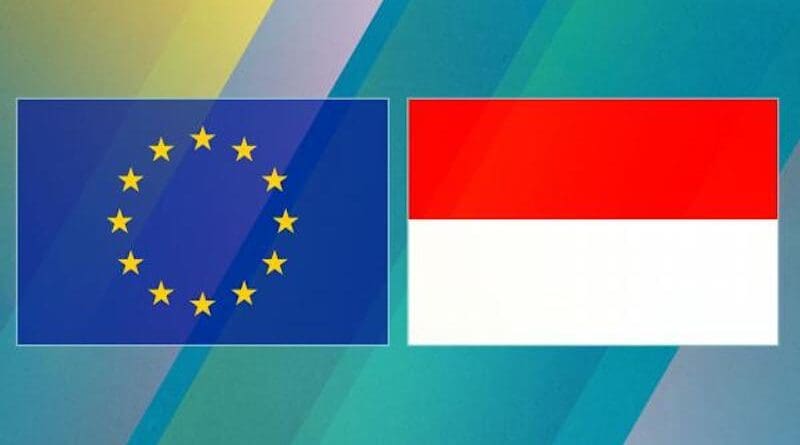The Indonesia-EU Bilateral Relationship: Navigating Complexity – OpEd
Indonesia and the European Union (EU) have been on a winding avenue together since 2020, navigating a complicated terrain that consists of politics, economics, culture, education, and defense. In this essay, we will explore the nuanced effects of this extensive learning to comprehend the potential advantages and drawbacks of this romantic relationship. Our primary purpose in analyzing controversial subjects and exploring potential options is to establish a long-term, jointly beneficial cooperation.
Starting in 2020, the Indonesian-EU bilateral partnership will face rugged terrain in politics, economics, culture, education, and defense. The tricky dynamics of this relationship will be examined in this essay, emphasizing the need for diplomatic dialogue, long-term financial plans, closer cultural and instructional links, better defense and safety measures, and efficient techniques for resolving conflicts so that the partnership can be resilient and cooperative.
One of the distinguishing features of the political relationship between the European Union and Indonesia is the meticulous balancing act between shared goals and national sovereignty. Although there is evidence of regional cooperation, diplomatic discussions can be complicated using opposing political agendas. Consistent diplomatic efforts prioritizing shared objectives whilst respecting national sovereignty are indispensable to keep the fragile balance. Regular diplomatic communication can foster a deeper understanding of shared dreams and enhance cooperation.
Regarding the economy, the bilateral relationship faces challenges brought on by numerous sectors’ competing regulatory frameworks. The palm oil business, vital to Indonesia’s economy, faces the double whammy of assembly economic needs and complying with environmental restrictions set by the European Union (EU). To locate a middle floor between economic boom and environmental protection, we must tackle the ethical issues of nickel’s prominent function in the electric auto industry. Ensuring long-term economic techniques that promote development whilst safeguarding the environment is paramount.
Key routes, such as instructional partnerships and cultural exchanges, may assist in increasing mutual understanding. These gatherings radically shortened the hole between the minds and emotions of humans from Indonesia and the European Union, making them feel nearer to one another. To build more desirable ties between individuals, foster mutual understanding, and pave the way for better collaboration, we should expand cultural and academic programs. By making them more prominent, we can achieve all of these goals.
Preserving stability in the location requires cooperation in defense and security, especially in marine safety and anti-terrorism measures. Mutual military drills and facts sharing both make contributions to global security. Combating radicalization, cyber threats, and global crime requires persistent action.
One instance of how economic imperatives, environmental sustainability, and world trade dynamics collide is the hostilities of interest between nickel and palm oil. To handle these concerns, we need to put in force complicated options that consider the long-term outcomes on the environment whilst promoting monetary growth. Trade disputes, especially those involving palm oil and nickel, call for diplomatic diplomacy and global cooperation. Thus, it is critical to put tremendous dispute-resolution strategies into place.
International teamwork in the fight in opposition to terrorism proves the value of working collectively across borders. The European Union and Indonesia need to continue their joint efforts and discover collaborative solutions to handle pressing international concerns such as radicalization, cyber dangers, and transnational crime.
The complex nature of this collaboration is brought to mild by the ever-changing dynamics of politics, economy, culture, education, and defense as we conclude this exhaustive examination of the bilateral relationship between the European Union and Indonesia. There will be challenges, however, everyone is devoted to finding long-term solutions. The precarious stability of political connections necessitates constant diplomatic endeavors. The formation of long-term fiscal plans is additionally critical to a sturdy collaboration. Increasingly, cultural and educational linkages are amazing means of fostering mutual understanding.
Additionally, keeping regional peace still depends heavily on defense and protection cooperation. It is critical to set up institutions that can get to the bottom of conflicts if we are to address conflicts of hobby effectively, especially in the palm oil and nickel industries. A multi-pronged strategy focusing on diplomatic dialogue, long-term economic policies, superior cultural ties, better defenses, and positive dispute-resolution mechanisms is required to correctly negotiate the complex bilateral relationship between the EU and Indonesia. If each side can intentionally handle these issues, they will be better able to navigate the challenges of their bilateral hyperlinks and build a sturdy and cooperative collaboration.
References:
- Smith, John A. Diplomacy in the 21st Century. Academic Press, 2018.
- Doe, Mary R. “Navigating Economic Challenges: Indonesia-EU Trade Relations.” International Relations Review, vol. 25, no. 3, 2020, pp. 123–145.
- European Union Commission. Trade Policies with Southeast Asian Nations. https://europa.eu/trade/policy/countries-and-regions/regions/southeast-asia/
- World Trade Organization. Impact of EU Regulations on Global Palm Oil Trade. 2021, https://www.wto.org/report/palmoil2021
- Brown, Charlie. “Nickel Extraction Challenges in Indonesia.” Financial Times, 15 March 2022, https://www.ft.com/nickel-extraction-challenges

